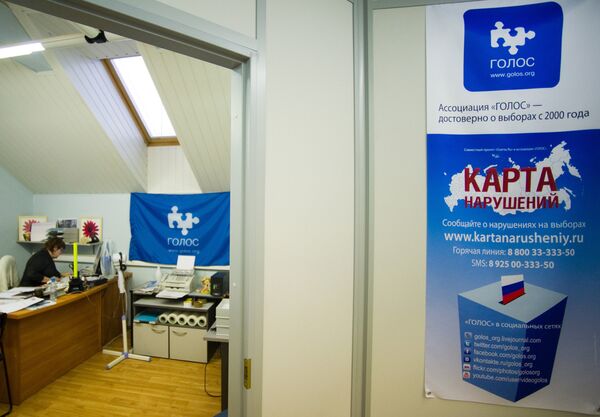Russia’s largest independent election monitoring group, Golos, said on Monday it was being pressured by the authorities ahead of presidential polls at which Prime Minister Vladimir Putin is to seek a third stint in the Kremlin.
“We are talking here about the open intimidation of Golos members and attempts to evict the organization from its office,” Golos representative Alexander Kynev said at a downtown Moscow news conference.
He also said the authorities were guilty of “phone-tapping, as well as breaking into letter boxes and accounts on social networking sites.”
Western-funded Golos often complains of pressure by the authorities. Late last year, a report on state television accused the organization of serving U.S. interests and attempting to instigate a revolution in Russia.
The group’s head, Lilya Shibanova, was also detained for over 12 hours at a Moscow airport ahead of last December’s parliamentary polls after she refused to hand over a laptop that Customs officials said could contain material harmful to Russia’s interests.
Golos, which plans to deploy some 2,000 monitors to the March polls, says it has been ordered to vacate its Moscow office by Wednesday, despite having paid through August 1. The owner of the property, the Literaturnaya Gazeta publishing house, said last week it needed the office for planned expansion.
Shibanova said on Monday that a new online map designed to monitor suspected vote fraud at the presidential polls was up and running. The group’s online map of alleged election violations at December’s parliamentary vote was closed down by a denial-of-service attack by hackers on the morning of the polls. Shibanova accused the Federal Security Service (FSB) of being behind the attack. The FSB did not comment.
Golos confirmed on Monday that no checks of the complaints uploaded to the online map would be made, but that denials would be posted alongside allegations.
Shibanova also said reports from regional representatives raised “serious concerns” ahead of March’s vote.
“Golos observers have been called in for individual talks where they are told it would be better not to work with us,” she said, without supplying further details.
December’s parliamentary polls saw widespread claims of vote fraud in favor of Putin’s United Russia party and were followed by the largest anti-government protests in Moscow for some two decades. A new mass rally is due to take place in the Russian capital on February 4.
Public anger over suspected electoral violations led to a swift pledge by outgoing President Dmitry Medvedev of significant electoral reform, including on the registration of parties and presidential candidates.
But Shibanova said on Monday that “nothing had changed.”
“There have been no meaningful, positive changes in the [electoral] law,” she said.
Medvedev has submitted two draft bills on electoral reform to the lower house of parliament.
The head of the liberal Yabloko party, Grigory Yavlinsky, was denied registration for the presidential polls last week by election authorities, in a move that he said was “politically motivated.” Election officials barred Yavlinsky after judging that just over a quarter of signatures submitted in support of his bid were invalid or fake.
Would-be presidential candidates who are not members of parliamentary parties are required under Russian law to collect two million signatures in support of their bids in order to receive the green light to participate in polls, a requirement slammed by Golos on Monday as “unrealistic” and “artificial.”
“In order to gather the signatures, someone has to knock on the door of almost half of all of Russia’s apartments or houses,” Kynev said.
Yavlinsky commented on Monday on his Live Journal blog of the “unacceptable” difficulties in collecting the necessary signatures in time.
Of the four independent candidates who attempted to register for the presidential elections, only billionaire Mikhail Prokhorov – seen by critics as a Kremlin project designed to split the opposition - was successful.
Putin, who held the presidential post from 2000 to 2008, is considered the most likely candidate to win the presidential election on March 4. However, analysts suggest rising discontent among Russia’s nascent middle class could see him forced into a runoff.
The other candidates set to stand against Putin are veteran Communist Party leader Gennady Zyuganov, Liberal Democratic party head Vladimir Zhirinovsky and Sergei Mironov, a former speaker of the upper house of parliament who is now head of the A Just Russia party.


